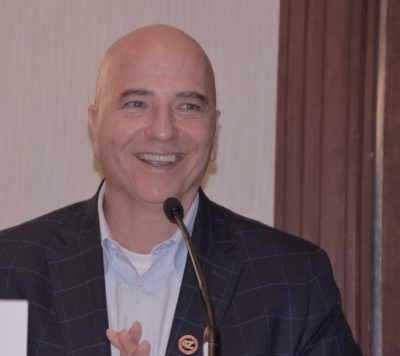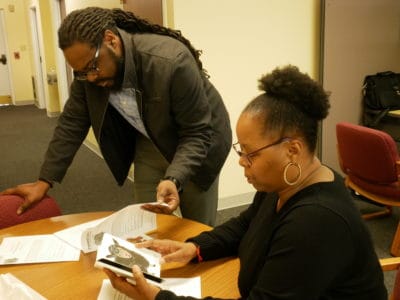
It’s long been said that children rise to the expectations of the trusted adults in their lives, and research has indeed found that students learn more from teachers who believe in them. Another way to define a teacher’s expectations is to measure how he or she approaches grading. In short, does it help a student who has a “tough grader” for a teacher? Should we be concerned about teachers who award “easy A’s”?
We recently partnered with American University’s Seth Gershenson in a new study to learn how teachers’ grading practices impact student achievement. Specifically, he examined whether the grading standards of Algebra I teachers in North Carolina affected students’ mastery of the relevant content, as measured by their performance on the Algebra end-of-course (EOC) exam. He also looked into whether their grading standards impacted student performance in subsequent math courses like geometry and Algebra II — and if there were particular school and teacher characteristics that predicted whether a teachers’ grading standards might be more rigorous.
Gershenson defined teachers’ grading standards in a straightforward manner: Teachers who inflate grades — meaning they tend to assign good grades to students who perform relatively poorly on the EOC — exhibit low standards, while teachers who assign lower grades than we might expect given students’ exam scores exhibit high standards.
His study resulted in five key findings:
- Students learn more from teachers who have higher grading standards.
- Teachers with higher grading standards improve their students’ performance in subsequent math classes up to two years later.
- The positive effect of higher standards impacts students of all types and in all kinds of schools. Whether black, Hispanic, white, male, or female, students learn more when taught by teachers with higher grading standards.
- Teachers who attended selective undergraduate institutions, hold graduate degrees, and have more experience tend to have higher grading standards.
- Grading standards tend to be higher in suburban schools, middle schools, and schools serving more advantaged students.
We take two key lessons from these results. First, we should use information about grading practices to improve instruction. Teachers are not to be blamed for having low grading standards when many of them don’t know where to set the bar for high-quality student work. This is not a major focus of most teacher preparation or professional development. Education Trust has provided a valuable service by taking a closer look at what teachers assign students and asking whether those tasks reflect today’s higher academic standards. Similar questions should be raised about teacher grading practices.
Likewise, schools and districts would do well to share with teachers how their grading standards compare to those of other instructors teaching the same subjects and at the same grade levels. Teachers need to know whether their expectations fail to match — or possibly surpass — those of their colleagues. Educators might be more willing to aim higher if they knew they were off target and taught how to get closer to the bulls-eye.
Second, let’s not forget that none of this is possible without an external measure of student performance. The simple definition of grading standards used in this report can be easily calculated by schools and districts — but only if they have a summative test, such as an end-of-course exam. To its credit, North Carolina has had EOCs in place for over three decades; yet it now appears that their fate is in peril.
Let’s be honest. Most of us want teachers to have high expectations when it comes to grades, but we’re gradually making it harder, not easier, for teachers to do that. Case in point: More than one thousand colleges and universities have adopted test-optional admissions policies, including Wake Forest University and High Point University in the Tar Heel State. Proponents argue that college entrance exams provide an unfair advantage to middle- and high-income students. Not requiring them, they say, expands access for poor students and students of color.
There’s plenty of debate about whether that’s true, but one thing seems clear: Without admissions tests, grade-point averages will now matter even more, so it’s crucial that they be accurate representations of a student’s academic performance. The current push for test-optional college admissions makes it that much more difficult for high school teachers, who now face even greater pressure to be easy graders to help their students get into selective colleges.
Don’t believe it? Consider these three comments from teachers who were recently interviewed about their grading practices for the qualitative part of our study:
“It just kind of seems like now there’s so much pressure on teachers to, frankly, inflate the grade to help out a student because I know I’ve been told, ‘Hey, Mr. [name], I got a B in your class, it’s the only class I ever got a B in, and it might cost me the scholarship.’”
“It’s hard because we live in such a small community out here. Everybody knows everybody, and I don’t know if it’s an intentional pressure, but the pressure that, ‘If I say no to this person, will it bite me later on? Will I need something some day?’ And they’ll be like, ‘Well, you didn’t help my kid get his A.’”
“There’s times where I get emails from parents that are just like, ‘I demand to know the rationale behind my kid’s score. I demand to know why my kid got a B. My kid has an A in all the other classes but yours. You need to do the right thing and change their grade to an A.’”
Teachers who maintain high grading standards in the face of these pressures are true heroes. All of us should treat them as such.





